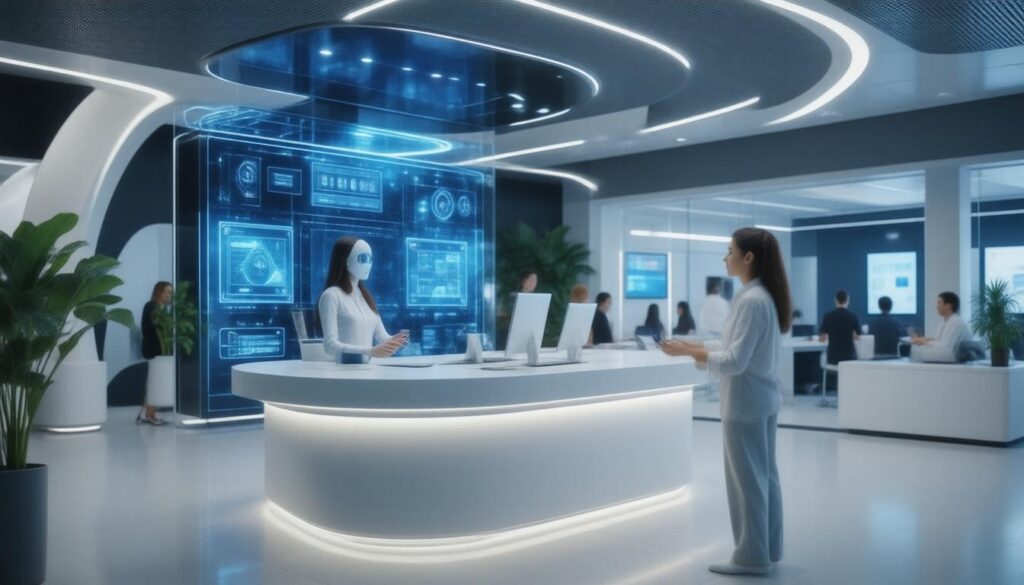Transform Legal Operations with AI Virtual Receptionist Technologies

In an increasingly competitive business landscape, where customer service can be a defining factor for success, adopting innovative solutions like an AI virtual receptionist has become essential.
An AI virtual receptionist can streamline operations, heighten efficiency, and significantly enhance customer interactions.
Both large and small businesses recognize the substantial benefits of integrating these intelligent systems into their workflows.
This article explores how AI virtual receptionists function, their myriad advantages, and practical implementation considerations, as well as the trends shaping the future of customer service.
By understanding the transformative capabilities of AI virtual receptionists, businesses can better meet customer needs, boost operational efficiency, and encourage growth.
Key Takeaways
- AI virtual receptionists streamline operations and improve efficiency in business communications.
- They provide 24/7 availability, ensuring customer inquiries are addressed promptly.
- Implementing an AI virtual receptionist enhances the overall customer experience by offering quick, accurate responses.
- Businesses should consider challenges such as data privacy and system integration when adopting AI virtual receptionist technology.
- Future trends suggest that AI virtual receptionists will become even more sophisticated, leading to improved customer service outcomes.
Introduction to AI Virtual Receptionists
Today’s fast-paced legal environment challenges law firms with client communication and workflow optimization.
An effective solution gaining traction is the AI virtual receptionist. This innovative technology not only boosts client engagement but also addresses common issues such as missed calls and after-hours inquiries.
By automating communication and streamlining client intake systems, an AI virtual receptionist enhances operational efficiency for law firms of all sizes while ensuring responsive client service.
Imagine offering your clients immediate responses and personalized service, even during your absence. With AI-driven tools from providers like Cogni AI, legal practices can transform their client interaction model, allowing attorneys to focus more on billable hours.
Benefits of Using an AI Virtual Receptionist
In today’s fast-paced legal environment, an AI virtual receptionist offers significant benefits by improving efficiency and enhancing client engagement.
This technology answers client calls around the clock, aptly addressing one of the most common challenges: handling missed calls that can lead to lost leads.
With capabilities like automated communication, these systems provide real-time interactions, manage appointments, and gather crucial client intake information.
This automation allows legal professionals to recover valuable billable hours. Law firms using AI solutions from Cogni AI report enhanced client satisfaction due to immediate responsiveness.
Adopting this technology could provide the competitive edge your firm needs as the legal landscape evolves.
‘The greatest danger in times of turbulence is not the turbulence; it is to act with yesterday’s logic.’ – Peter Drucker
How AI Virtual Receptionists Enhance Customer Experience
Maintaining consistent client communication is crucial in today’s legal markets.
An AI virtual receptionist is a game-changer, bridging the gap between law firms and potential clients. It ensures that calls never go unanswered, even after hours or during busy court sessions.
This system handles client intake efficiently, allowing your legal team to concentrate on their primary tasks. Law firms using AI-enhanced systems from Cogni AI experience heightened client satisfaction and operational efficiency.
Implementing an AI Virtual Receptionist in Your Business
Integrating an AI virtual receptionist can revolutionize client interaction and administrative operations at your law firm.
This technology manages calls and inquiries efficiently, ensuring comprehensive responsiveness. It also automates routine queries and schedules necessary appointments.
Law firms highlight improved client retention and satisfaction due to these quick interactions and efficient follow-ups. Such enhancements address common challenges like missed calls, enhancing your firm’s reputation.
Challenges and Considerations when Using AI Virtual Receptionists
While AI virtual receptionists offer significant benefits, they also present challenges that require strategic consideration.
One major concern is miscommunication. While these systems manage routine inquiries well, they might not handle complex legal questions effectively.
Implementing this technology necessitates a thoughtful integration strategy and comprehensive training for staff. Additionally, maintaining data security is crucial; firms must ensure that their AI solutions comply with regulatory standards.
Future Trends in AI Virtual Receptionists and Customer Service
As firms aim to enhance client satisfaction and streamline operations, AI virtual receptionists are set to redefine client engagement.
These systems ensure no call goes unanswered and manage client interactions efficiently. Investments in AI technology allow law firms to remain competitive, building stronger client relationships through enhanced support and immediate responsiveness.




